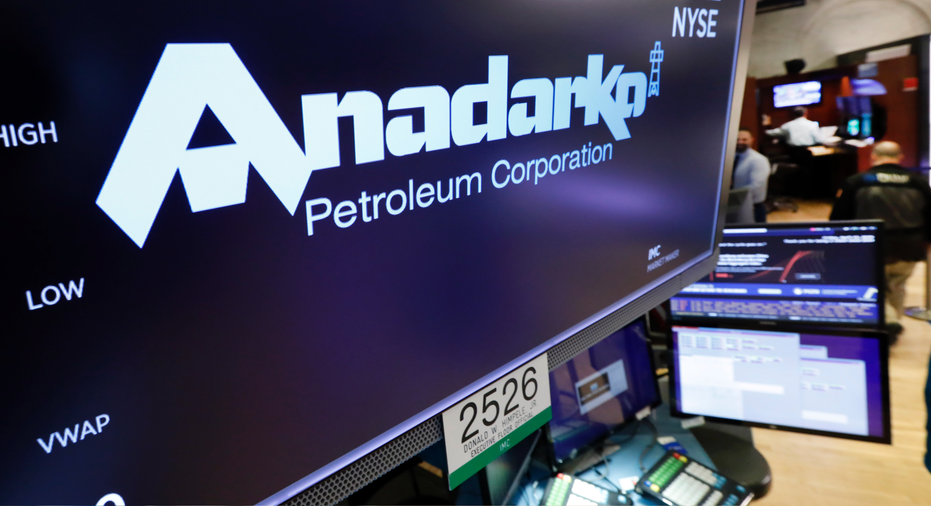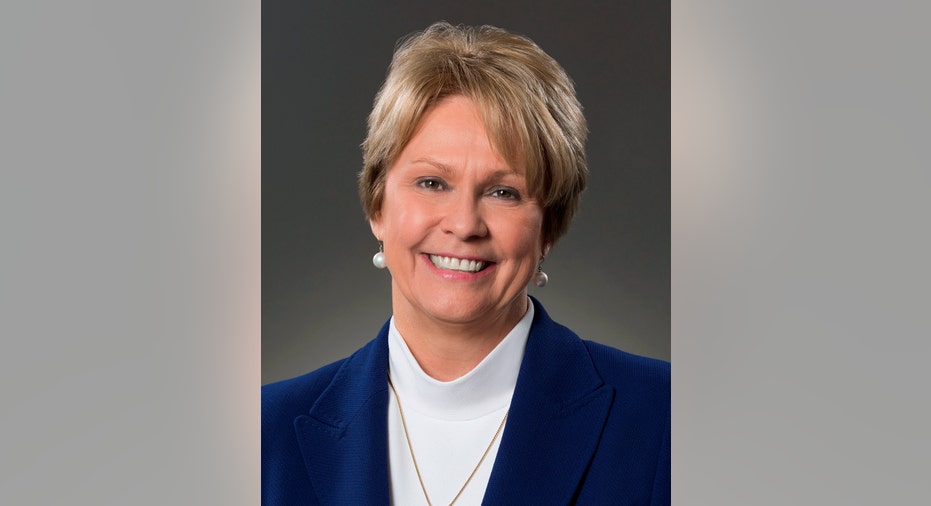Anadarko opens Occidental buyout talks; Chevron in the wings
FILE - In this April 12, 2019, file photo the logo for Anadarko Petroleum Corp. appears above a trading post on the floor of the New York Stock Exchange. Anadarko plans to restart takeover talks with Occidental, less than a week after Occidental made a competing bid to Chevron’s deal. Anadarko Petroleum Corp. said Monday, April 29 that it’s resuming talks with Occidental because its board determined Occidental’s offer could possibly be a superior proposal to the Chevron transaction. (AP Photo/Richard Drew, File)
NEW YORK – Anadarko, which had snubbed Occidental's buyout offer in favor of Chevron, is now resurrecting talks with its original suitor.
The move sets up a bidding war for Anadarko Petroleum Corp., which had accepted Chevron's $33 billion bid even though it had been in talks with Occidental for some time.
Vicki Hollub, the CEO of Occidental Petroleum, said she was taken by surprise when she first heard the news about Chevron. She had been pursuing Anadarko for two years and was in what she considered to be friendly negotiations, although she was aware Anadarko had another suitor.
"We attempted to do this in a friendly way, and then I found out driving into the office ... that they sold to Chevron, which was a shock to me," Hollub told The Associated Press in an interview late last week. "And since we'd been working it for two years with them, I really thought we'd get a courtesy call back as we made our final attempt to buy them, prior to the announcement of the Chevron deal."
Anadarko had agreed to Chevron's offer earlier this month. Then Occidental shot back last week with an offer it said was 20% higher. Anadarko said Monday it is reconsidering Occidental's bid, setting up the rare possibility of a bidding war in the oil patch. Chevron believes its signed agreement with Anadarko provides the best value and the most certainty to Anadarko's shareholders, the company said in a statement.
The skirmish is surprising. "Even if we look back at two decades of history, this is virtually unprecedented," said Pavel Molchanov, senior vice president and equity research analyst at Raymond James & Associates.
Chevron's deal was valued at $50 billion including debt and book value of non-controlling interest, compared with Occidental's $57 billion. Anadarko would have to pay a $1 billion breakup fee if it doesn't complete its deal with Chevron.
Prior to the Chevron deal, Occidental had made several proposals that were higher than what Anadarko accepted from Chevron, Hollub said.
"I'm still trying to figure out what happened in these negotiations," Hollub said. "I just don't know what went on behind the scenes."
Nevertheless, Hollub still sees in Anadarko an opportunity to create value for Occidental's shareholders. She said Anadarko is massively undervalued, and her company could extract more from Anadarko's wells at a lower cost.
Another benefit: an acquisition also would give Occidental access to Anadarko's cash flow, she said.
That cash flow is increasingly attractive to oil and gas companies as they begin to de-emphasize exploration, said David Deckelbaum, managing director at Cowen & Co. Oil prices have fluctuated massively over the last five years, during an industry downturn. In the process, some investors lost their appetite for double-digit production growth and told companies to make more prudent decisions instead of taking on initiatives that leave companies exposed, Deckelbaum said.
Hollub herself is a rare figure in the oil and gas industry as the lone female CEO. In more than three decades at Occidental, she rose through the ranks, developing a reputation as a leader who's collaborative and willing to test the limits of what her equipment and company can do.
"There's very few of her peers in the industry who have tried to work on a pump in Russia in the middle of winter in the oil field, or tried to get equipment into the jungle in Ecuador," said Kenneth Dillon, president of international oil and gas operations at Occidental.
Being a smaller company has enabled Occidental to remain nimble, and more aggressive than larger companies, she said.
"Chevron is a much bigger company, but size doesn't make it better, and it certainly doesn't make it the best," Hollub said.
While Occidental appears to be offering a better deal in the short term, there are long-term reasons why Chevron might be a better fit, including geographic overlap between Chevron and Anadarko in the Gulf of Mexico and the Permian Basin, Deckelbaum said.
Even so, some industry analysts see a bidding war as bad for both Occidental and Chevron. The oil and gas exploration industry is very fragmented, so if a particular buyer is looking for an acquisition "there is no shortage of things to buy," Molchanov said. "The better choice for either buyer in this case ... would be to pursue individual assets, and not this bidding war."
Shares of Anadarko and Chevron edged higher Monday, while Occidental's stock fell 2 percent.





















